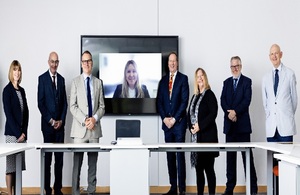Joint statement on elections in Libya – December 2021
France, Germany, Italy, the UK, and the United States of America welcome the statement of the Secretary-General’s Special Adviser (SASG) on Libya, Stephanie Williams on 23 December and commend the work of the SASG to engage in broad consultations across Libya over the past ten days. We express our strong support for the ongoing efforts of the United Nations Support mission in Libya (UNSMIL) to further a Libyan-led and Libyan-owned process towards the holding of free, fair and inclusive elections.
We take note of the High National Electoral Commission’s (HNEC) statement of 22 December on the postponement of the ballot scheduled on 24 December and its proposal for a new, early date on which to hold those elections. We call on the relevant Libyan authorities to respect the aspirations of the Libyan people for prompt elections by swiftly determining a final date for the polling and issuing the final list of presidential candidates without delay.
We commend the technical and logistical preparation already undertaken by HNEC for the holding of elections as stipulated in the Libyan Political Dialogue Forum roadmap and endorsed in UNSC resolution 2570 (2021), as well as the conclusions of the second Berlin conference of 23 June 2021 and during the Paris International Conference for Libya of 12 November 2021. We recall that free, fair and credible elections will allow the Libyan people to elect a representative and unified government, and reinforce the independence, sovereignty, territorial integrity and national unity of Libya. It is important that momentum towards these goals is maintained.
In line with the Paris declaration, France, Germany, Italy, the UK and the United States of America recall their understanding that the transfer of power from the current interim executive authority to the new executive authority shall take place following the announcement of the results of such early and prompt parliamentary and presidential elections. To avoid conflicts of interests and to promote a level playing field, candidates holding roles in public institutions should also continue vacating them until the announcement of the electoral results.
We reiterate UNSMIL’s call for disagreements on emerging political or military matters to be resolved without resorting to violence. We stand ready to hold to account those who threaten the stability or undermine the political and electoral process in Libya, through violence, or the incitement of violence. We affirm that individuals or entities, inside or outside Libya, who obstruct, undermine, manipulate or falsify the electoral process and the political transition will be held accountable and may be designated by the United Nations sanctions committee in accordance with UNSC resolution 2571. We commit to respecting the UN-facilitated, Libyan-led and owned political process and urge all other international actors to do the same.

